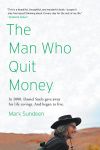 Mark Sundeen: The Man Who Quit Money.
New York:
Riverhead Books, 2012.
Mark Sundeen: The Man Who Quit Money.
New York:
Riverhead Books, 2012.
On the cover of Mark Sundeen's book, not quite as a subtitle, is the byline: "In 2000, Daniel Suelo gave away his life savings. And he began to live." This book attempts to answer the implied question: How can this be?
Daniel Suelo, born in Colorado in 1961, is not a hermit, but his motivation is clearly spiritual, perhaps religious, in his own way, He tells the author: "I keep studying the Bhagavad Gita, the Tao Te Ching, the Sermon on the Mount, and the Gnostic Gospel of Thomas, and I've been reading bits and pieces of and about Henry David Thoreau, Gandhi, and Tolstoy. ..."
Supplementing the book's biographic details, Suelo's website and blog meticulously lay out his perennial philosophy. A dominant theme in his moneyless living is his fundamentalist Christian upbringing and its scriptural literalism -- Suelo took up the better part, selling what he has to follow the path of the lilies of the field and birds of the air, to live free and depend upon the grace of God -- or nature, or fate. (Suelo once offered a free talk at the local public library titled "The Common Thread in World Religions" but only a few people showed up, including his parents.)
Suelo's upbringing (nee Shellabarger), the long shadow of his fundamentalist preacher-father and pious mother, their itinerant household, Suelo's conflictive adolescence, his years of vagabonding, his move to dichotomous Moab, Utah -- part "hippie," part alienated Mormon -- and his decision to live in outskirt caves, all are detailed. Sundeen attempts to identify Suelo with libertarian views on money, but Suelo's own writing doesn't emphasize this. Moab's temperate climate and more temperate tolerance attracted Southern Californians who set the atmosphere that attracted Suelo. After his trip to India, Suelo called himself an American sadhu, but geography, like the desert for early Christian hermits, dominates his landscape, plus the wondrous caves and the unique social circle in which he moves.
Sundeen's book offers the personal components motivating Suelo to embrace radical simplicity. The story is as complex as it is compelling. One senses that the biographee was probably more reticent than the biographer in chronicling his life to date. The spiritual angle, an intriguing path of reflection, establishes a strong counterpart to an understanding of historical eremitism and contemporary possibilities of living without money.
¶